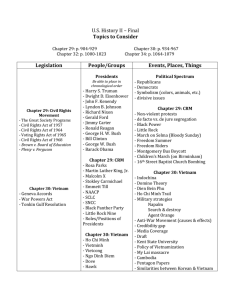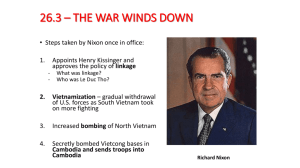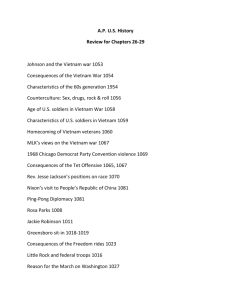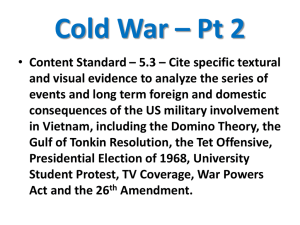US History Unit 9 Week 2
advertisement
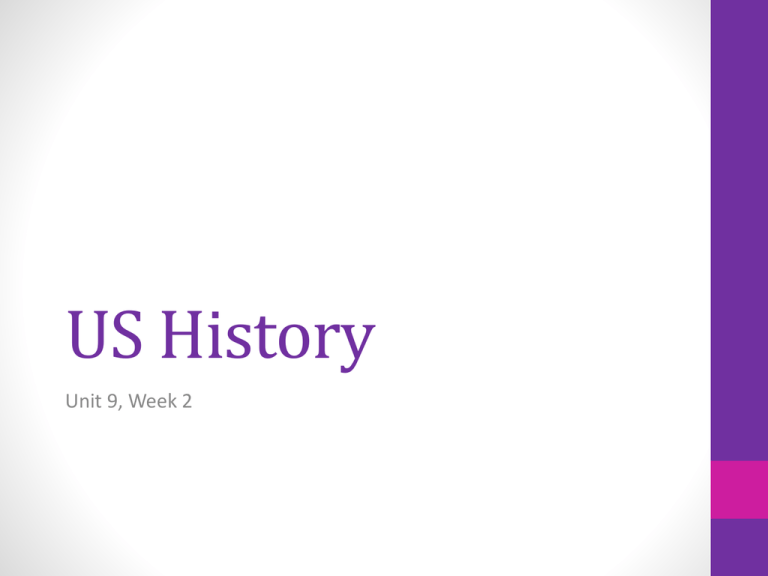
US History Unit 9, Week 2 Agenda for Monday, April 21 Human Be-in: Expand your mind • Homework • Cornell Notes: pgs 649-653 • Get caught up on your vocab packet, due block day • Question authority Human Be-In • Station Rotation • You will participate in an outta sight experience today involving the most happening movements of the 1960s. • All chicks and dudes will move from station to station see the choice trends of the times in a hands on manner. • Don’t be a spaz and get involved! Station A: The New Left-Letter Writing • You were inspired by a speech given by Mario Savio at UC Berkeley and now you want to promote activism through your support of the Free Speech Movement. You are so tired of people trying to shut down your opinions just because you are young. They act like you don’t have anything intelligent to say… fools. Begin a letter writing campaign by writing to Governor Jerry Brown about a cause that is important to you. Make sure to relate it to the Free Speech Movement and your basic first amendment rights. Station B Anti-Establishment-Slogan • You are a hippie who wants to reject the views of the “Establishment” because they control society and make us all act like sheep. Think about it, we should be treated like individuals and not just students in a factory that produces mindless middle management drones. Do something! Think about a cause that you feel passionately about and create a slogan on a nametag that you will wear all day. Make sure to relate it to similar causes that the hippies cared about in the 1960s. Station C Personal Liberation- Finger Painting • You are feeling frustrated with the political and religious environment of the time and you want to freely express yourself and reach a higher understanding of who you are and what you want. We need to have the freedom to do what we want so that we can “shed hypocrisy, dishonesty, and phoniness, and go back to the purity of our childhood values.” Therefore, you can participate in the classic childhood activity of finger painting. Express yourself and reach a new height of personal liberation. Station D: Culture Clash • You are feeling disenchanted with the “little boxes” of suburbia and you are looking for an alternative way of life. You also want to reject materialism and the conventional lifestyles of the 1950s. You want to find beauty in the natural world instead of the capitalist factory system that America has become. Feel free to use face paint with your friends to express your feelings of love and nature while talking about your feelings and your ideal utopic society. Station E: Counterculture- Fashion Change • You want to reject the conventions of modern fashion and feel the need to express yourself as an individual. Change something about your appearance (within the dress code ) to demonstrate your individualism. Station F: Parents Just Don’t Understand- Lyrics • The growing Generation Gap has forever changed the way you relate to your parents. They just don’t seem to get you man. They think you are sinful slackers who don’t care about their future. They criticize you for being spoiled little rich kids when they don’t realize that you are practicing communal living where you all work and live together. Little do they know is that you are trying to make a better future for everyone around the world. Write a song or poem to express your frustrations with the Generation Gap. Damn the Man! The Times They Are A Changin’ – Bob Dylan • Come gather 'round people Wherever you roam And admit that the waters Around you have grown And accept it that soon You'll be drenched to the bone If your time to you • Is worth savin' Then you better start swimmin' Or you'll sink like a stone For the times they are achangin'. • Come writers and critics Who prophesize with your pen And keep your eyes wide The chance won't come again And don't speak too soon For the wheel's still in spin And there's no tellin' who That it's namin' For the loser now Will be later to win For the times they are achangin'. • Come senators, congressmen Please heed the call Don't stand in the doorway Don't block up the hall For he that gets hurt Will be he who has stalled There's a battle outside And it is ragin' It'll soon shake your windows And rattle your walls For the times they are achangin‘ Come mothers and fathers Throughout the land And don't criticize What you can't understand Your sons and your daughters Are beyond your command Your old road is Rapidly agin' Please get out of the new one If you can't lend your hand For the times they are achangin'. Agenda for Tuesday, 4/22 • HOT ROC • The Vietnam War Experience • Homework • Yesterday HW: Cornell notes p. 649-653 • Today: Cornell Notes on p.675-677 and glossaries collected block day #9 HOT ROC: What are the perspectives of “Hawks” and “Doves”? Use p.664-665. Hawks: what are your reasons for escalation (more involvement) in Vietnam? Doves: what are your reasons for getting out of Vietnam? • 1. • 2. • 3. • 1. • 2. • 3. Who fought for the U.S.? • Early years (1960-1966)—professional soldiers and volunteers. • Later years (1966-1973)—the Draft. (Selective Service System—WWI) • By December 1966, the draft call was up to 40,000 men each month. • By 1973, 2.15 million Americans had served. How to Avoid Vietnam How could you avoid serving in the war? • Conscientious objector status • Illness • Go to Canada • Student status • National guard service • Later: • http://www.history.com/topics/vietnamwar/vietnam-war-history/videos/dodgingthe-draft Which young men* were drafted? • Lower income • No college degree • African Americans and Latino Americans made up 31% of early combat troops. • They were much more likely to see heavy combat. • Over half of the 234 sons of Congressmen and Senators received deferments, only 28 were sent to Vietnam – none were killed *10,000 women served as nurses and other support roles. Who were the Vietcong? • Ho Chi Minh’s main force were uniformed, full-time soldiers • Additional local Vietcong groups— often teenagers motivated by idealism or anger at the US and located in South Vietnam. They didn’t wear uniforms. Guerilla Warfare • • • • Hit-and-run maneuvers Tunnels, bunkers, land mines, & booby traps Difficult Terrain & weather Viet cong had a strategy of “cling to the enemy’s belt” How many died? • U.S.—58,000 killed, 200,000- 400,000 wounded • Vietnamese—1 million combatants killed, 4 million civilians. • Effects of Agent Orange – http://cnnphotos.blogs.cnn.com/2013/01/30/effects-of-agentorange-ongoing-silently-in-children/?hpt=hp_c3 The War becomes unpopular • Using p. 675-676, list 5 reasons why Americans began to oppose Vietnam War 1. 2. 3. 4. 5. Agenda for Block Day 4/23-4/24 • Collect glossaries • My Lai Massacre inquiry • Homework • Cornell Notes on p.682-683. *last day to take unit 8 test The War becomes unpopular • 5 reasons why Americans began to oppose Vietnam War 1. Politicians raise questions. “Why are we there? How will we win?” 2. Media (TV) shows horror of war 3. Economic cost 4. Anti-war protests on campus 5. (Government) credibility gap #9 VIETNAM NOTES Gulf of Tonkin Resolution (1964) • N. Vietnamese torpedoes fired on U.S. destroyer • LBJ asks for authority to use “all necessary measures to repel and prevent aggression” • Gave broad congressional approval for expansion of war War Powers Resolution • 1970 – Congress repeals the Gulf of Tonkin resolution • 1972 – Congress finds out the Nixon has still been secretly bombing Cambodia they pass the War Powers Resolution which restores the congressional powers about declaring war. • Is it better to have the President or Congress in charge of declaring war? • Why is there is a division of roles during war? (congress=declare war, president= commander-in-chief) What happened at My Lai? Context • Tet Offensive*: January, 1968, the Viet Cong and North Vietnamese army launches a massive surprise attack. • US responded with a counter-offensive 2 months later. • Destroying a Viet Cong battalion in the town of My Lai was part of this. What happened at My Lai? • https://www.youtube.com/watch?v=V Wchy6ykNnQ#t=111 (~2:30) • Lt. William Calley commanded the troops that entered My Lai on March 16, 1968. • The “search and destroy” mission soon transformed into a brutal massacre of 300 unarmed Vietnamese men, women and children. • This story was revealed to the American public in 1969 by investigative journalist Seymour Hersh. • Following a government investigation of events, Lt. William Calley was sentenced to life in prison for murder. What happened at My Lai My Lai massacre is a case study/lens to look at what America struggled with in Vietnam (physically, psychologically, morally) Our task: Investigate through primary sources (1) what really happened at My Lai? (2) what does it reveals about the American experience in Vietnam? Discussion questions 1. The Vietnam War is often considered the only war the United States has ever lost. • What can the My Lai Massacre tell us about why the US lost in Vietnam? 2. America’s defeat in Vietnam was relatively small/insignificant in terms of our global Cold War strategy. However, the Vietnam War is often seen as incredibly damaging to the US. • What can the My Lai Massacre tell us what the US really lost in Vietnam? • • • • Troops in Vietnam https://www.youtube.com/watch?v=uSJcAqFwjmY https://www.youtube.com/watch?v=BLnImuOzCAE (3:00-4) • • • • https://www.youtube.com/watch?v=pPCRNq_R22A Haditha Killings https://www.youtube.com/watch?v=TqWgcrjZ6x0 Abu Ghraib scandal Agenda for Friday, 4/25 • #12 HOT ROC • Nixon T-chart (positive, negative) • HW: Finish t-chart #12 HOT ROC: Nixon • Read textbook p.697 • Watch https://www.youtube.com/watch?v=I9LcAJOsFGg 1. 2. 3. What happened? (2-3 sentence summary) What effect would “Checkers speech” have on the public? On Nixon’s career? What does the speech tell you about Richard Nixon as a person? *leave space underneath. We will add important notes Monday Mini biography: http://www.biography.com/people/richard-nixon-9424076 #13 Positive and Negative Aspects of Nixon Directions: 1. Partners choose either the positive or negative 2. Read section 54.2-54.3 and find positive/negative things done by Nixon 3. Exchange info with your partner Positive Aspects Negative Aspects • By 1972, less than 30% of Americans agreed with the Vietnam War. • For 1972 election, candidates debate Vietnam Continued #12 “Peace with Honor”- Nixon • https://www.youtube.com/watch?v=Sx3rt9IYtUM • Peace with Honor= Just a reelection strategy? • “Vietnamization” pulling US troops, shift responsibility to S. Vietnamese • Withdrawing all troops immediately from Vietnam would be a disaster. Nixon asked for united support "to end the war in a way that we could win the peace.“ • Appealed to the "silent majority”: large group of conservatives who generally supported the war but didn’t voice their beliefs in the 60s.

![vietnam[1].](http://s2.studylib.net/store/data/005329784_1-42b2e9fc4f7c73463c31fd4de82c4fa3-300x300.png)

